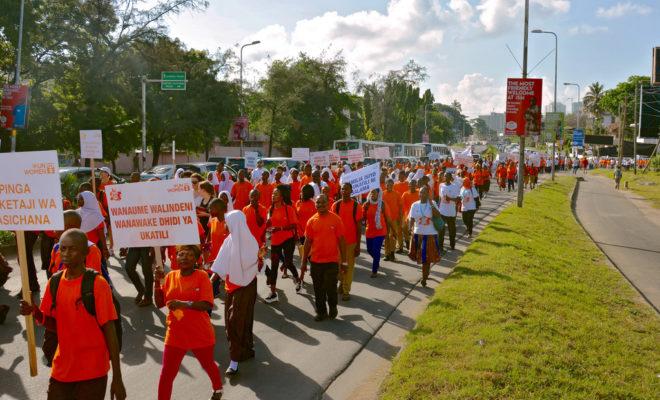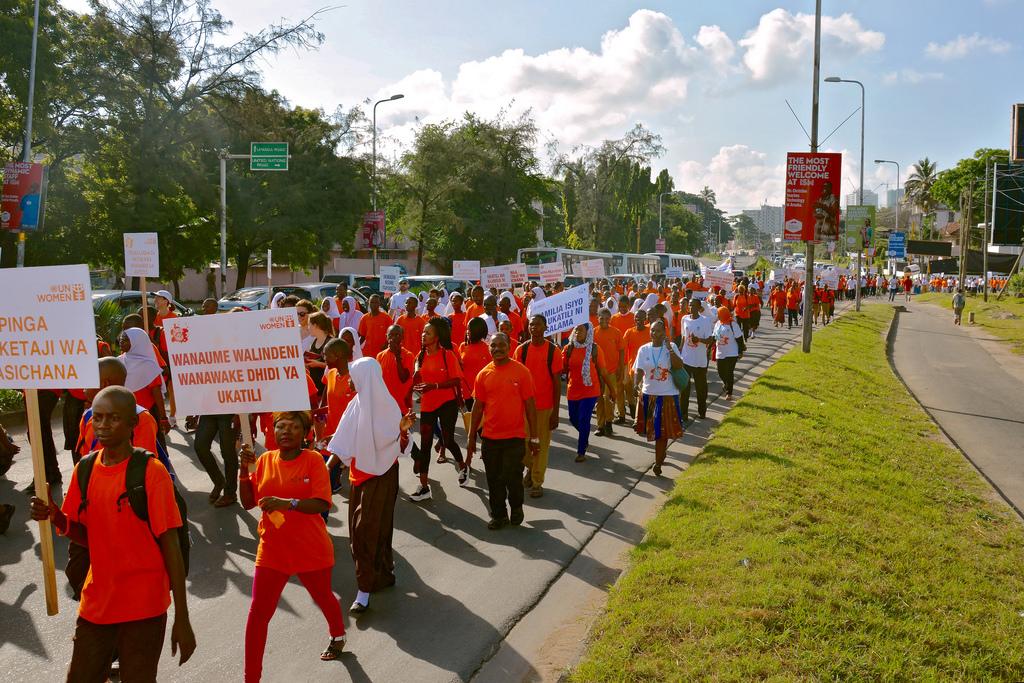A woman online, in Tanzania

Tanzanian twitter has lost its chill. It’s become a scary place for women and dissenters. But we’re not yet ready to give it up.

Hundreds march in Dar es Salaam, Tanzania, in 2017 calling on people to speak out and take action to end violence against women and girls. Credit: UN Women/Deepika Nath.
Hello, Elsie here! @Mikochenireport, blogging for the currently suspended Mikocheni Report. Undependable Instagrammer. Avid Reddit lurker. YouTube aficionado. Comfortably mediocre social media peon.
I have been a woman online for over two decades now and consider the World Wide Web an essential part of life. I’ve loved it since the first struggles with dial-up at overcrowded internet cafes in Dar es Salaam. Since Netscape and Napster. Since Gmail accounts were only available by invitation. I love it still, passionately, for the hashtag movements and freedom to self-publish. I love it for breaking barriers and creating new frontiers like Cryptocurrency. Through the internet, we’re as close as we’ve ever come to developing a hive mind, which is both scary and exhilarating.
But along this two-decade journey, much of the web has changed. It’s become darker both globally and locally here in Tanzania.
My blog, which I first set up in 2008, is now on hiatus because of new regulations that came into effect this May. These repressive laws have had a radical effect on our online ecology and it’s not clear yet how many critters have survived the bushfire. In this respect, Tanzania is keeping up with the trend sweeping the continent: that of stifling public debate in the last untamed wildernesses.
This is why I am protesting, resting, and spending a lot more time on Twitter these days. That’s where much of what remains of our real-time democratic public dialogue struggles on, just out of reach of the state.
Tanzanian Twitter is wonderfully unique…just like every other Twitterverse. We are unapologetically and enthusiastically self-involved. Gossip about local celebs, religion and politics reigns supreme. Tedious earnestness and querulousness are discouraged, while a sense of humour is a must. Equally essential is the ability to decipher the layered complexity, earthiness and double-entendres of Kiswahili, a deliciously subtle and supple language whose capacity for nuance is only enhanced by Twitter’s imposed brevity.
Tanzanian Twitter culture is also characterised by the excessive “politeness” that we get teased about by our East African neighbours. At least it was until recently…
Trolls in Tanzania
Since 1977, Tanzania has been ruled by the same party, Chama Cha Mapinduzi (CCM). Over those forty-plus years, there have been several different administrations. They have all had their own distinct approaches, but each has introduced some elements of progressiveness, whether economically, socially or both. The current administration under President John Magufuli, however, may just buck this trend.
Some of his government’s reforms are certainly welcome. The previous approach to economic liberalisation brought with it corruption, cronyism and inefficiency. Enforcing a stronger work ethic in the civil service and increased investment in infrastructure are much needed.
However, there is a much less welcome trend of reforms driven by conservative social values that has been detrimental to, in particular, women and dissenters. Since coming to office in 2016, President Magufuli has publicly encouraged women to “pop out” babies. He told citizens in the south that if they protested he would start their punishment by “beating the Prime Minister’s paternal aunts” (the PM is from the south) if he could. He has ordered that schoolgirls who fall pregnant be expelled from school.
President Magufuli has made women’s place in public and private life more precarious. And this has, in turn, emboldened chauvinists to bring their misogyny online now too. Whereas we used to argue on Twitter about which policies and ideals were best for the nation, we are suddenly being divided into those who are for the president and those against. Women are punished for speaking out, while men who dissent are told their opinions are umama – “womanish” in the worst kind of way.
Tanzania’s new dispensation – combined with a post-truth world of Trump, Cambridge Analytica, and Russian Troll Farms – has meant that our mellow online space is losing its chill. We suspect we are being monitored more closely than is comfortable – or constitutional – by authorities ready to impose hefty fines or jail time for violating new regulations. Meanwhile, online trolls – we call them bots here – who have emerged in the past two years have soured our mood considerably while muddying all rational debate.
It has got to the point that I recently found myself pathetically grateful when a fellow tweep tweeted something about women that was funny, insightful and warm. That’s when it dawned on me that something is wrong. When did I become so exhausted, timid and beaten down that the smallest civilities are enough to move me to tears?
Last year, I found myself embroiled in the most frightening Twitter fight of my life against a pro-establishment account. That handle has since disappeared, but I am still worried that the person or persons behind it will read this piece and get satisfaction from knowing I remain afraid. You never forget the first time you’re told “we can find you”, especially in an era when people, friends, have been detained, abducted, worse. We only just got the kidnapped billionaire Mo Dewji back and are deeply relieved even while we note how his long-time friend and ruling party MP January Makamba received some interesting pushback for demanding he be found as quickly as possible.
The Resistance
I came of age online in Tanzania at a time when the youth, arts and ICT were all getting love from the government. A time before the advent of Russian troll farms and professional chaos-mongers. A time before our protected spaces were angry enough for real fights or for the kinds of soul-destroying insults now regularly cast at women; Kiswahili swearwords are infinitely more severe than can be conveyed in English.
In that sense, I had a sheltered upbringing. And so, in the last two years I have had to steadily learn to be quieter, more “amiable”, to occupy less space, to hide my bruises and say “don’t worry about it, my blog just walked into a door, how clumsy of me…”
Sound familiar?
There are many ways I could live in peace: silence, sycophancy, slavery to the worst aspects of the patriarchy, self-pity. But, like I said, I’ve been spending a lot of time on Tanzanian Twitter. And along with the bots, misogynists and mouthpieces, there they are too: The Resistance. The irrepressible smart-asses who turn tragedies into comedies to shame their oppressors, who crush bots with facts and brutal sarcasm.
The resistance is diverse. There are those like the cartoonist @MasoudKipanya, who remains fearless in his commentary on current events. There’s the head of the Tanzania Law Society @Fatma_Karume, who has appropriated the title of Paternal Aunt to take on all comers, especially the professional chauvinists. (Read her timeline if you want a small taste of how ugly the bots can get.) The resistance also includes old-school Nyerereists turned Twitter poets like @IssaShivji. It counts among its numbers young blood scholars like @Udadisi who keeps the lyrical tradition strong in our generation while making pan-Africanism contemporary, woke and up-to-date in its reading list.
There are also all the accounts I cannot name out of respect for their privacy in these trying times, who remind us that kind words and evidence based on facts are capable of reclaiming the Twitterverse from the Dark Side.
Tanzania’s longstanding peace isn’t some lucky coincidence or the result of a rustic naiveté. It is a complex and calibrated social construct whose maintenance and vulnerabilities have always required hard work to address. This work has been done, and continues to be done, in the “real” world, but now we have – of necessity – taken this ethos online. I’m not going to lie to you. This post-truth, Google-spies-on-you world is scary. But when has anything progressive, “kind”, or worth doing ever been easy?
So let me try this again. Hello, Elsie here. Citizen of the World Wide Web. A feminist online in Tanzania for just about a decade now. I’m a little bit bruised and worse for wear, but I think I might just have a blog to go save with a little help from some friends. It’s just a small corner of this internet I love so much, but it’s one I can’t afford to abandon.






Hi there! My name is Alice and i randomly came across your article through google searching for something. I’m a 26 year old American feminist woman living in Brooklyn, NY. Just wanted to say thanks for writing and sending you love and support. I’m sorry your dealing with those patriarchal assholes online and in your government/ daily life. Your awesome for continuing to fight against it, keep it up!
Solidarity and Revolution!
Alice